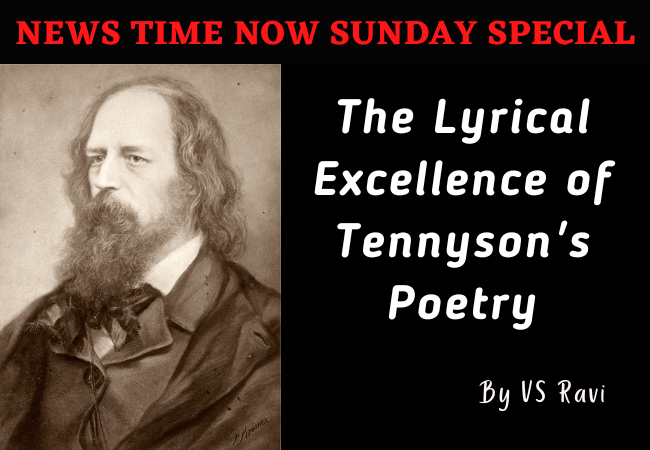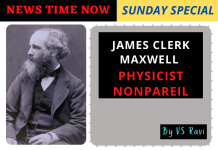T. S. Eliot, retrieving Tennyson from years of prejudice and neglect described Tennyson as “the most instinctive rebel against the society in which he was the most perfect conformist”. Before he threw away his genius by attempting to conform to the Victorian idea of Poet Laureate, Tennyson wrote some of the best lyrics in the language. His best poetry is personal, exotic, and sublimely resistant to literary criticism. Tennyson’s greatness consists in a natural ability to express loss, desolation, despair and other irreducibly sad emotions.
Alfred Lord Tennyson was born in Somerset, Lincolnshire, in England the son of a country rector whose large and varied library provided his earliest inspiration. He began writing poetry at the age of eight, and in 1827 he and his brother Charles published their first book ‘Poems by two brothers’. The following year, he went to Trinity College, Cambridge but left before completing his degree. The year 1830 saw Tennyson’s first important book, although it was badly received by the critics.
In 1833, he published Poems including the ‘Lady of Shallot’ and ‘The Lotus-Eaters’ which were liked by the general public, acclaimed by Tennyson’s friends and virulently attacked in the Edinburg Quarterly. In the same year his closest friend and most perceptive critic Arthur Hallam died suddenly in Vienna at the age of twenty-two, an event that was to have a profound influence upon Tennyson’s life and writing. He began ‘In Memoriam’ which grew over the years into the record of a spiritual conflict and a confession of faith. Generally considered to be Tennyson’s most important work, this sequence of lyrics and speculations about mortality in tribute to Hallam was published anonymously in 1850.
In 1842 Tennyson published Poems including Locksley Hall and Ulysses and in 1847 ‘The Princess’ a serio- comic epic about female emancipation embodying his finest lyrics. It was his first popular success running through five editions in six years. However only with the publication of ‘In Memoriam’ in 1850 did Tennyson’s financial position allow him to marry Emily Sellwood to whom he had been engaged for seven years. On Wordsworth’s death in April 1850, he was appointed Poet Laureate, whereupon he assumed for the next forty-two years the peculiarly Victorian mantle of public poet, although with an underlying ambiguity which informs us so much of his mature verse.
Tennyson’s earliest adult poems reveal his skill at drawing from classical myth and medieval legend (Ulysses , Morte D’Arthur).The colour and richness of his imagery and descriptive writing shows the influence of Keats . I invite the attention of the reader to some of the exquisite lines from Ulysses, which I have quoted below:
‘ I cannot rest from travel: I will drink
Life to the lees: all times I have enjoy’d
Greatly, have suffer’d greatly both with those
That loved me, and alone, on shore and when
Tho’ scudding drifts the rainy Hyades
Vext the dim sea; I am become a name;
For always roaming with a hungry heart
Much have I seen and known; cities of men
And manners, climates, councils, governments
Myself not least, but honour’d of them all;
And drunk delight of battle with my peers,
Far on the ringing plains of windy Troy
I am a part of all that I have met; ‘
‘How dull it is to make a pause, to make an end
To rust unburnish’d not to shine in use’
‘And this grey spirit yearning in desire
To follow knowledge like a sinking star
Beyond the utmost bounds of human thought’
and
arguably his best lines
‘We are not now that strength which in old days
Moved earth and heaven ; that which we are, we are;
One equal temper of heroic hearts,
Made weak by time and fate but strong in will
To strive, to seek, to find, and not to yield’
For a long time I had felt that I had read a similar sentence somewhere else. One day it struck me.In Milton’s Paradise Lost there is a passage which has the following lines,
‘ What though the field be lost?
All is not Lost; the unconquerable will,
And study of revenge, immortal hate,
And the courage never to submit or yeild’
The echo of the two words ‘to yield’
in the last line of each quote is unmistakable !
Incidentally Tennyson’s line
‘To strive, to seek, to find, and not to yield’
was quoted by Judy Dench (the Shakespearean actor) when she acted as ‘ M ‘ in a James Bond movie !
The main theme of Morte D’Arthur is the dying request of King Arthur to the last of his knights Sir Bedivere. King Arthur tells Bedivere that posterity would surely come to know about his exploits and so Excalibur, his famous sword may be thrown into the very lake where years ago a white hand had come out and given it to him. But Bedivere tries to persuade him not to send him to throw Excalibur because King Arthur is alone and wounded and a little thing may harm him. However he said he would carry out the king’s orders and departs. Tennyson uses a figure of speech called onomatopoeia (the formation of a word from a sound associated with what is named (e.g. cuckoo, sizzle) to describe Bedivere’s walk to the lake.
The onomatopoeia is :
‘Through zig zag paths and juts of pointed rock’
Came on the shining levels of the lake’
‘Zig zag’ and ‘juts of pointed rocks’ indicate a rough surface of the path to the lake, which is a hindrance to walking fast. In contrast the line
‘Came on the shining levels of the lake’
has eight open vowels indicating the smooth surface of the lake.
This is probably the best example of onomatopoeia in all literature .
Bedivere is reluctant to carry out Arthur’s orders. So at the very last minute he decides not to throw Excalibur into the lake, conceals it and returns.
King Arthur, realises that Bedevere has not thrown the sword into the lake, gets very annoyed and asks Bedivere to go and throw the sword into the lake.
This time also Bedivere, after reaching the lake tells himself that the king is sick and does not know what he does. If Excalibur is thrown into the lake
“What record or what relic of my lord
Should be to after time, but empty breath
And rumours of a doubt? but were this kept
Stored in some treasure-house of mighty kings
Some one might show it at a joust of arms
Saying ‘King Arthur’s sword Excalibur’ This is the finest example in literature of a figure of speech called ‘sophistry’.’ Sophistry ‘ means making someone to believe something that is not true, especially for personal gain-of course in this case Bedevere who is unwilling to throw the sword, is trying to convince himself.
So he again conceals Excalibur and returns .
Arthur guesses again that Bedivere has not thrown Excalibur into the lake. He gets infuriated and threatens Bedivere saying he would slay him. Bedivere gets nervous, goes to the lake a third time and throws Excalibur into the lake.
Much later the nervous Bedivere asks King Arthur
‘Ah! my Lord Arthur, whither shall I go?
Where shall I hide my forehead and my eyes?
For now I see the true old times are dead,
When every morning brought a noble chance,
And every chance brought out a noble knight’.
And slowly Arthur answer’d from the barge:
‘The old order changeth, yielding place to new,
And God fulfils Himself in many ways,
Lest one good custom should corrupt the world’
Tennyson’s Locksley Hall reveals the lyrical excellence of his poetry at its best:
Tennyson predicts the rise of both civil aviation and military aviation in the following words
‘ For I dipt into the future, far as human eye could see
Saw the vision of the world , and all the wonder that would be
‘Saw the heavens fill with commerce, argosies of magic sails,
Pilots of the purple twilight dropping down with costly bales,
‘Heard the heavens fill with shouting, and there rain’d a ghastly dew
From the nations’ airy navies Grappling in the central blue;
‘Far along the world-wide whisper of the south-wind rushing warm,
‘With the standards of the peoples plunging thro’ the thunder-storm;
‘Till the war-drum throbb’d no longer, and the battle-flags were furl’d
‘In the Parliament of man, the Federation of the world.”
“Locksley Hall” is a dramatic monologue written as a set of 97 rhyming couplets Each line follows a modified version of trochaic octametre in which the last unstressed syllable has been eliminated; moreover, there is generally a caesura whether explicit or implicit, after the first four trochees in the line. Each couplet is separated as its own stanza. Tennyson, reportedly claimed that it was written in trochaics because the father of his friend Arthur Hallam suggested that the English liked the meter. The meter is reminiscent of that of the Nibelungeunlied, a German epic poem.
In his monologue, the protagonist recalls fond memories of his childhood sweetheart, but those memories lead to a burst of anger as he relates that the object of his affections abandoned him due to her parents’ disapproval. He proceeds to offer a biting criticism of her husband who supplanted him in her affections, interspersed with personal reflection. This criticism is only really interrupted when he reflects that she will eventually have a child, and will be more concerned with her child than about the protagonist. The protagonist promptly continues his angry tirade, this time directed at the mother–child relationship.
The protagonist seeks escape from his depression by thinking he might immerse himself in some sort of work that would distract him, but finds this impossible
Tennyson’s superb metric manipulation was well developed by 1833: in ‘Oenone’,’ The Lady of Shallot’ and ‘ The Lotus- Eaters his use of language and metre to sustain the dream-like and tragic inability of his protagonists to act against the inevitability of their situation is expertly and sensitively controlled.
Tennyson frequently presented legendary heroes as spokesmen for his own moral attitudes, as indicated above, but he was also concerned the innate moral heroism of ordinary domestic life. This led him at times to destroy a passing theme by inappropriate sentiment, or to strangle a poem’s natural energy by simultaneously overlaying it with moral insignificance cautiously restraining the human activity as in ‘Enoch Arden’. But it was poems such as this that were most popular, although not necessarily praised by his critics. His ‘Idylls of the King’ have often been criticised for their use of legend as a vehicle for Victorian moralising. But Tennyson was genuinely concerned at the contradictions of Victorian Britain and was not able to reconcile the two sides of his sense of responsibility- the one that worried and the one that saw itself as the prophet of the age. While being confident of progress and the value of a humbly heroic stance, he remained deeply troubled, by the unpredictability of human emotions and behaviour. In 1855, the year after the publication of his most jingoistic poem” The Charge of the Light Brigade’, he wrote ‘Maude’ an intense, group of lyrics describing a tragic love affair. The violent rhythms and impassioned language completely override any impression of complacency or narrow-mindedness that Tennyson suggests elsewhere.
Tennyson had an almost unflawed metrical understanding and it enabled him to handle a wide variety of forms. He was equally happy with the rapid narrative of ‘The Princess’ and the short lyrics that he later added to the poem. In his lyrics he created in language that is both precise and suggestive, an identity of mood and physical surroundings. The nostalgia of ‘Tears Idle Tears’ the insistent sadness of “Break, Break, Break, products of rhythmic control as much as of language, infect to some degree most of his poetry. Even in his prophetic optimism, his melancholy is hovering near. T. S. Eliot called him the saddest of all English poets.
Tennyson was a careful poet as his much-revised manuscripts show, and he never lost touch with his earliest attitudes. He returned again and again to the same themes and moods. But if he was limited in scope and if his talents were hampered by public demand – for he was one of the most popular of major poets – and by his own sense of moral duty, his metrical skill remains quite breathtaking, in its vigour and delicacy.
On October 6, 1892, an hour or so after midnight, Tennyson died at Aldworth with the moon streaming in at the window overlooking the Sussex Weald, his finger holding open a volume of Shakespeare, his family surrounding the bed. A week later he was buried in the Poets’ Corner of Westminster Abbey, near the graves of Browning and Chaucer. To most of England it seemed as if an era in poetry had ended.
T.S. Eliot wrote of Tennyson ‘He has three qualities which are seldom found together except in the greatest poets: abundance, variety, and complete competence. He had the finest ear of any English poet since Milton’.


















































